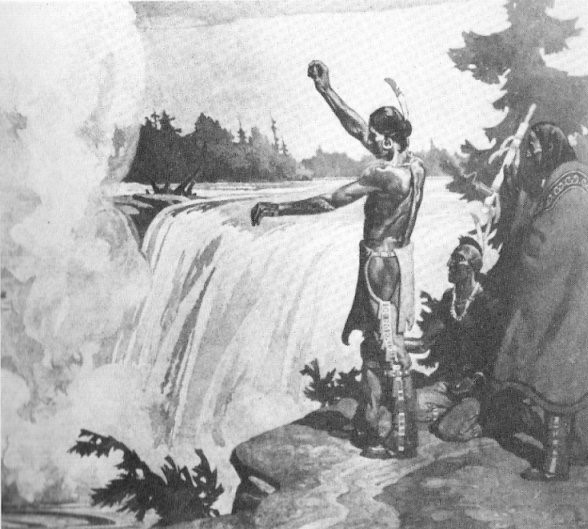
Question 3: We began this unit by discussing assumptions and differences that we carry into our class. In “First Contact as Spiritual Performance,” Lutz makes an assumption about his readers (Lutz, “First Contact” 32). He asks us to begin with the assumption that comprehending the performances of the Indigenous participants is “one of the most obvious difficulties.” He explains that this is so because “one must of necessity enter a world that is distant in time and alien in culture, attempting to perceive indigenous performance through their eyes as well as those of the Europeans.” Here, Lutz is assuming either that his readers belong to the European tradition, or he is assuming that it is more difficult for a European to understand Indigenous performances – than the other way around. What do you make of this reading? Am I being fair when I point to this assumption? If so, is Lutz being fair when he makes this assumption?
In “First Contact as Spiritual Performance”, Lutz discusses the challenges in communication and mutual comprehension between Europeans and Native peoples in their first encounters. In my reading, the author does not appeal exclusively to the European audience, but rather assumes that his own perceptions are shadowed by the European tradition, because “we have insufficient distance from our own and our ancestors’ world view” (Lutz, 18). I also assume that Lutz warns about his own imperfect comprehending “the performances of the [I]ndigenous participants” (18) and transmission of the Indigenous belief concepts, because cultural perceptions represent “a challenge that can be met, at best, only partially” (18). He regular includes the first person writing in plural form in the text, which suggests that he places himself on the same boat as his readers, without distinction for their belonging to European or Indigenous tradition.
At the end of the paragraph, which is addressed in this question, Lutz’ concern about hidden challenge “to step outside and see one’s own culture as alien and to discern the mythic in the performances of one’s own histories” (18) has been addressed to all readers, whether they are with the Indigenous or non-Indigenous background. The latter prompts to doubt that the author assumes that it is more difficult for Europeans to understand Indigenous performance than the other way around.
However, I noticed that while reading the chapter after this paragraph I constantly think of the invisible but invincible barrier between the European and Indigenous cultures. It appears that on the one hand, the author encourages his readers to challenge towards better familiarization and understanding each other’s traditions. On the other hand, he establishes a strong assumption for us that the only way to overcome the cross-cultural comprehension barrier is to radically alter our original perceptions that have been taught to us. I feel that such approach can be very dangerous and cause damaging and isolation between people from different cultures. It even sounds to me like imposing a binary thinking, when one may register either European or Indigenous world view without the possibility of mutual understanding between two traditions.
I agree that there are many challenges on the way of comprehension of cultural differences, which are not limited to communication between the Indigenous and non-Indigenous people; they are natural for international relationships all over the world. I strongly believe that we can reduce and remove the communication challenges through learning each other, rather than alienating our own perceptions. One way to start looking at the same things from different cultural perspectives is to recognize, respect and reconcile the differences in cultural context, as suggested by Avindra Fernando.
Works Cited
Fernando, Avindra. “Think Global: How to Overcome Cultural Communication Challenges.” OpenCource.com, 18 Oct. 2018. Web 04 Feb. 2020. https://opensource.com/article/18/10/think-global-communication-challenges.
“First Nations History in the Ottawa, Ontario, Canada Area”. Bytown. 24 May, 2013. Web image. Web. 06 Feb, 2020 http://www.bytown.net/nativehist.htm
Long, Ryan. “The Good, Bad, and Ugly of Binary Thinking . . .” Center for Internet and Society, Web blog post. 21 Oct. 2015. Web. 06 Feb, 2020 http://cyberlaw.stanford.edu/blog/2015/10/good-bad-and-ugly-binary-thinking.
Lutz, John. Myth and Memory, Stories of Indigenous-European Contact. E-book, Google Play, 2007, 16-32. https://play.google.com/books/reader?id=vo8xZDz6j2oC&pg=GBS.PA30.w.1.0.0.
Hi Joanne,
Your analysis of Lutz was really interesting! Lutz says that “one must of necessity enter a world that is distant in time and alien in culture, attempting to perceive indigenous performance through their eyes as well as those of the Europeans.” Do you think he is playing into the myth of the “Vanishing Indian” here by referring to Indigenous culture and performance as “distant in time”? (http://pluralism.org/religions/native-american-traditions/introduction-to-native-peoples-traditions/myth-of-the-vanishing-indian/ ) Or is he assuming that his own perceptions are shadowed by the European tradition, as you articulated in your post?
Thanks,
Eva
Hi Eva,
Thank you for reading my blog and bringing an interesting and thought-provoking question. From what I’ve read in “Myth and Memory”, I’m not convinced that the assumption of “Vanishing Indian” is fair. In my reading, Lutz shares reflections on the stories of the Indigenous-European contacts, including very first contacts which are “distant in time”. I think that the central question addressed by the author is “What if the contacts happened differently?”, and I do not see how the myth of “Vanishing Indian” may fit here. On the other hand, if to consider the quote which you are referring to, in the isolated context, within the the wording in the quote, this point could be assumed. What is your opinion? What would be your answer in the broader context of “Myth and Memory”?
Thank you, Joanne